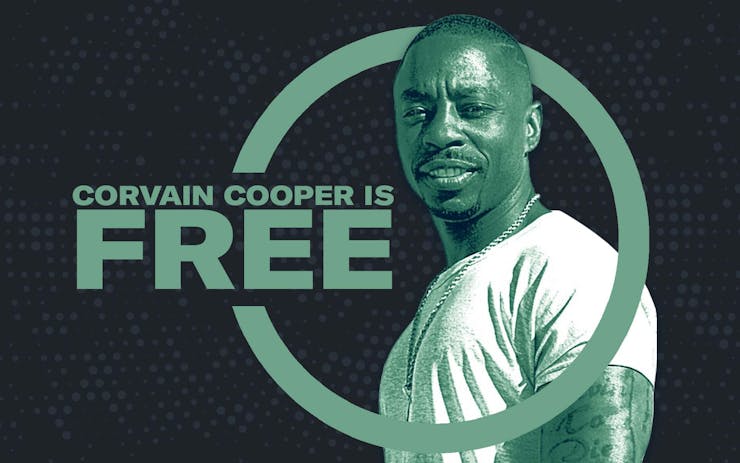By now you’ve probably heard of Corvain Cooper, and if you haven’t, you surely will.
Corvain Cooper was born and raised on the Eastside of South Central, Los Angeles. He and his sister were raised by their grandmother who was able to keep them in magnet schools, but that didn’t make times in the hood any easier.
Facing the realities of impoverished living, Corvain turned to hustling in adulthood to make ends meet. After participating in a few non-violent crimes (petty theft, marijuana possession, and possession of cough syrup with codeine) that would ultimately land him in jail for the first time, he ventured into cannabis entrepreneurship in 2004.
Beginning with the sale of small amounts of weed, he eventually took part in a multi-state operation that shipped cannabis across the country. In 2011, a possession charge would land him in prison for about a year – sparking a change in his thinking and his lifestyle.
After getting out in 2012, Corvain left cannabis behind to open a clothing store featuring his own brands and focus on raising his two daughters. His past behind him, things were starting to look up for the business owner and father.
View this post on Instagram
Striking out with the Fed
Even though he had committed to living differently and started a new business as a free man, Corvain Cooper was apprehended on the afternoon of January 28, 2013. Turns out a previous business associate gave up a list of names from a business venture in 2009 in exchange for a shorter stint.
“I had just come back from New York for Christmas. I pull up to the house, and the feds jump out talking about Charlotte, North Carolina. I’m like ‘sh*t, I’ve never even been to Charlotte, North Carolina.”
– Corvain Cooper
Cooper was extradited to North Carolina and sentenced to life in prison without the possibility of parole under the Three Strikes statute.
Under the federal “Three Strikes” provision, offenders receive mandatory life imprisonment for a serious violent felony or two or more prior convictions in federal or state courts where at least one of which was a serious violent felony or a serious drug offense.
Corvain’s previous association with cannabis placed him in the drug offense category, even though he gave up the illicit business several years prior.
He had changed his life, but he still went to prison.
Fighting for freedom
In 2014, California Prop 47 reduced Cooper’s prior drug felonies to misdemeanors. And in 2016, adult-use cannabis legalized in California under Prop 64. Changes like these should have freed Corvain from his mandatory life sentence since his crimes were no longer serious and cannabis was legal, but they didn’t.
Instead, it was up to him, his family, his legal team, his supporters to file appeals, petition presidents for clemency, and prove his innocence according to the law.
Cooper’s attorney made a petition on Change.org that got over 40,000 signatures in the first month and over 150,000 by the time he walked out of federal prison. Word about his story spread, and he was even featured in a documentary about the Black community and cannabis.
“The priors that were on my jacket were no longer there. So, I’m thinking boom, resentence me, give me 10 years, and I’ll get time served. But we sent that to the Supreme Court, and that gets denied. Then we went to Obama for the clemency; that gets denied. So, we had to bank on Trump,” he said.
The day things changed
Finally, on January 20, 2021, Corvain Cooper was liberated. Pardoned by former President Trump on his last day in office, he is now free after serving eight years of a life sentence in prison behind nonviolent cannabis crimes.
View this post on Instagram
He says he had to keep the faith for something last minute, noting that the moment didn’t come until the very last second on the shot clock.
“It was morning time, and we were on lockdown. I’m was still trying to have faith that I’m leaving when Trump leaves, but he was getting on the helicopter to leave as I was going to get into the shower. I’m in the cell about five or 10 minutes, then out of nowhere, I hear: ‘You’ve got 5 minutes, pack it up,” he said.
Life on the outside
Now, Corvain Cooper is free from prison but has been thrust right back into the realities of his neighborhood. But this time, he has a different mentality.
View this post on Instagram
He has been working with 40 Tons (a social impact and lifestyle company) and Last Prisoner Project to use his story to help deter children from making his mistakes. Both ventures provide a platform that can help bring awareness to nonviolent cannabis offenders serving federal prison sentences.
“We’re in Cali where it’s expensive to live. It’s $600,000 to buy a house in the hood. I want to concentrate on saving the youth and telling them not to chase ghosts. Make sure they know the things they want and all those people that you’re hanging with – it could all end up bad.”
He is committed to change, even after the US justice system ignored his pleas for all those years, stating,”I want to go to talk to juvenile halls, jails. I don’t want to be quiet.”





